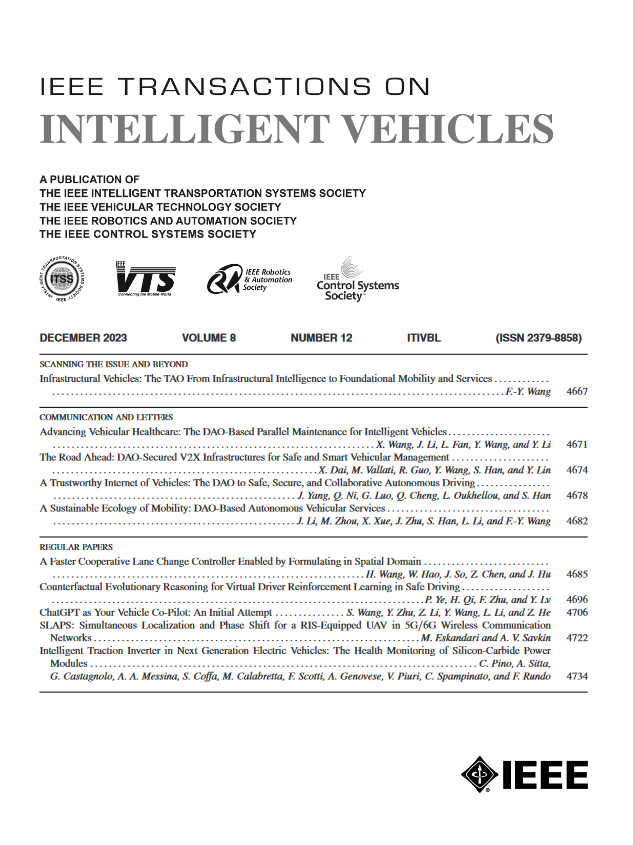Hierarchical Event-Triggered Control for CAV Platoons Using Adaptive Neural Network
IF 14.3
1区 工程技术
Q1 COMPUTER SCIENCE, ARTIFICIAL INTELLIGENCE
引用次数: 0
Abstract
In this paper, a hierarchical event-triggered platoon control framework is developed for connected and automated vehicle (CAV) platoons with unknown dynamics and communication resource limitation. Firstly, a two-layer model that consists of an upper-layer model and a lower-layer model is introduced to depict the longitudinal kinematic and dynamic characterizes of CAVs in the platoon. Secondly, a double-layer event-triggered platoon control design framework is proposed for the considered CAV platoon. In the upper-layer, an event-triggered platoon controller is designed to generate desired platoon trajectory for CAV. A compensation signal is properly defined such that the platoon controller allows the spacing policy of the CAVs switching among constant spacing, constant time-headway, and variable time-headway policies. In the lower-layer, an adaptive neural network sliding-mode controller is developed to force the CAVs to track desired trajectory. An event-triggering condition that made up of data transmission error and vehicle consensus error is designed to determine data transmission sequence, such that a balance can be achieved between data transmission and platoon control performance. Finally, theoretical analysis is presented to illustrate CAV state stability and platoon string stability, and simulation studies are carried out to further demonstrate feasibility and effectiveness of the scheme.基于自适应神经网络的CAV队列分层事件触发控制
针对具有未知动态和通信资源限制的联网自动车辆(CAV)队列,提出了一种分层事件触发的队列控制框架。首先,引入由上层模型和下层模型组成的两层模型来描述排内自动驾驶汽车的纵向运动学和动力学特性;其次,针对考虑的CAV排,提出了一种双层事件触发排控制设计框架。在上层,设计了事件触发的队列控制器,为自动驾驶汽车生成所需的队列轨迹。适当地定义补偿信号,使得排控制器允许自动驾驶汽车的间隔策略在恒定间隔、恒定车头时距和可变车头时距策略之间切换。在底层,设计了一种自适应神经网络滑模控制器,以迫使自动驾驶汽车跟踪期望的轨迹。设计了由数据传输误差和车辆一致性误差组成的事件触发条件,确定数据传输顺序,使数据传输与排控性能达到平衡。最后,对CAV状态稳定性和排串稳定性进行了理论分析,并进行了仿真研究,进一步验证了方案的可行性和有效性。
本文章由计算机程序翻译,如有差异,请以英文原文为准。
求助全文
约1分钟内获得全文
求助全文
来源期刊

IEEE Transactions on Intelligent Vehicles
Mathematics-Control and Optimization
CiteScore
12.10
自引率
13.40%
发文量
177
期刊介绍:
The IEEE Transactions on Intelligent Vehicles (T-IV) is a premier platform for publishing peer-reviewed articles that present innovative research concepts, application results, significant theoretical findings, and application case studies in the field of intelligent vehicles. With a particular emphasis on automated vehicles within roadway environments, T-IV aims to raise awareness of pressing research and application challenges.
Our focus is on providing critical information to the intelligent vehicle community, serving as a dissemination vehicle for IEEE ITS Society members and others interested in learning about the state-of-the-art developments and progress in research and applications related to intelligent vehicles. Join us in advancing knowledge and innovation in this dynamic field.
 求助内容:
求助内容: 应助结果提醒方式:
应助结果提醒方式:


